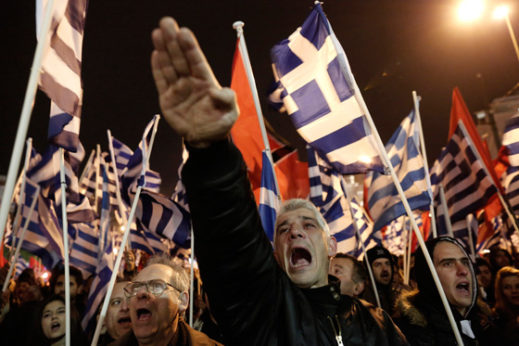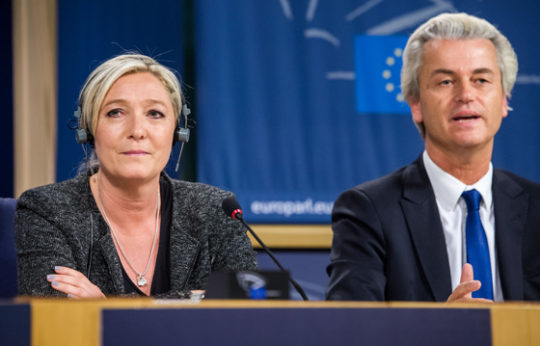
A few days before his inauguration, President-elect Donald Trump is consumed by explosive allegations concerning Russian intelligence services’ cultivation of his candidacy. The claims, which have plunged the presidential transition into turmoil, were published Tuesday by CNN and Buzzfeed. The scandal does not faze Trump’s most avid international supporters, though. He may be in hot water at home, but his far-right admirers outside the U.S. are still looking forward to January 20th.
Since Trump’s electoral college win in November, leaders of far-right and ultra-nationalist parties around the world have been gushing with praise for the incoming president and have broadcast their excitement at having someone they view as a kindred spirit in the White House. Sharing much in common with Trump ideologically, they hope his victory portends a brighter electoral future for their own movements.

Trump’s presidency, these parties believe, has the potential to shift the global geopolitical balance further toward the right and boost the fortunes of nationalist candidates. Like Trump, most of these parties and movements try to take advantage of the legitimate grievances and suffering of working class people, claiming their brand of politics will fix economic and social problems.
Although the president-elect and Republican Party spokespersons regularly attempted to deny the openly racist and xenophobic nature of his campaign rhetoric, Trump’s overseas fan club – much like the KKK and white nationalists in the U.S. – openly praise Trump’s raising of racial tensions as among his most important qualifications.
International Trump fan club
From Athens, Greece’s neo-Nazi Golden Dawn movement said that with Trump’s victory, “A great global change is starting.” The party, which has a history of murdering political opponents and inciting violence against immigrants, was an early and eager Trump endorser.
It views Trump’s win as the first of what it sees as a coming string of far-right wins, saying the trend “will continue with nationalists prevailing in Austria, Marine Le Pen in France, and Golden Dawn in Greece.”
The party’s statement continued, “This was a victory for the forces which oppose globalization, are fighting illegal migration, and are in favor of clean ethnic states.” It also expressed hope that Trump would forge a strong working relationship with Russia’s Vladimir Putin.
In France, a top strategist of Front National presidential candidate Marine Le Pen, Florian Philippot, tweeted, “Their world is collapsing. Ours is being built.” The latest polls show Philippot has reason to be excited: Le Pen has surged to first place in the race for the French presidency. Voters cast their first round ballots in April. Le Pen’s main challenger is center-right candidate François Fillon; the electoral chances of the divided Socialist Party and its candidate Manuel Valls, meanwhile, appear to have evaporated.
Frauke Petry, leader of the anti-immigrant and anti-Muslim Alternative for Germany party, similarly looks forward to a realignment of world politics along right-wing lines. Petry called the U.S. election outcome “encouraging for Germany and for Europe.” She argues that Trump represents a “political sea-change.”
Referring to the confrontational stance NATO takes toward Russia, the leader of Germany’s right-wing populists believes the incoming Trump administration has the potential to “reshape the Transatlantic relationship.” A U.S.-Russia rapprochement led by Trump and Putin, she said, could “end the big conflicts in Ukraine and Syria.”
Geert Wilders, an MP (member of parliament) in the Netherlands and head of the Freedom Party, praised Trump as a leader who took on the “political elite and the press.” He said Trump “has only one concern…the national interest of the voters of America who are concerned about immigration, who are concerned about job loss as a result of globalization, who are concerned about the Islamization of their society.” He further remarked that when Trump assumes office it will mean the people are “taking their country back.” He promised, “So will we.”
Austria’s Freedom Party, a direct descendant of that country’s pre-WWII Nazi Party, made headlines in recent weeks after its leader, Heinz-Christian Strache, met with Donald Trump’s pick for National Security Advisor, General Michael Flynn, at Trump Tower in New York. Strache has told his Facebook followers that America’s “political left and the out-of-touch and corrupt establishment” was punished by voters opting for Trump.
In Britain, Nigel Farage, former leader of the U.K. Independence Party (UKIP) and the public face of last year’s successful Brexit campaign, says that Trump’s presidency will be nothing short of a “revolution.” Referring to his own country’s choice to break away from the European Union as well as Trump’s victory, he characterized 2016 as “the year of two big political revolutions” and predicted America’s turn toward Trumpism will be “bigger than Brexit!”
Farage is the first foreign far-right leader confirmed to be attending Trump’s inauguration. He is slated to appear at the swearing-in as a guest of Mississippi Gov. Phil Bryant. Shortly after his win, Trump had stated that he thought British Prime Minister Theresa May should make Farage her ambassador to the U.S. The British government responded to the president-elect that there was “no vacancy” in the position.
North of the U.S. border in Canada, where the nationalist right has so far been lacking a popular base or a foothold in mainstream politics, Trump imitators have appeared on the scene. In the race to head the Conservative Party – which has been leaderless since Liberal Justin Trudeau’s October 2015 victory over Stephen Harper – MP Kellie Leitch compares herself to Trump.
Saying she stands for “Canadian values,” Leitch has sought to make the government’s admission of 37,000 Syrian war refugees the basis for an anti-immigrant political platform. She may have to face down reality TV star and investment mogul Kevin O’Leary of Shark Tank fame, who is also prompting comparisons to Trump.
And finally, in Russia, the foreign country most associated with Trump in recent days, there has also been an outpouring of praise and celebration for the Republican candidate since his November win. While President Vladimir Putin has been publicly circumspect concerning the Trump win, limiting his remarks to official congratulations and the hope for better relations, that has not stopped his political allies from expressing their glee.

On the night of the U.S. election, members of the Duma, the Russian parliament, watched live as the precinct results rolled in. Vladimir Zhironovsky, head of the ultra-nationalist Liberal Democratic Party and an ally of President Putin, popped open a bottle of champagne and toasted Trump’s victory. “To Donald Trump,” he said, “We can become allies in Syria, allies in Ukraine.” He also expressed optimism for changes to the NATO alliance and said perhaps the U.S. will no longer fund it.
Strengthening international ties
Though it appears that cross-border political coordination among the world’s far-right and ultra-nationalist parties remains uneven and relationships are still conducted on an ad hoc basis, communication among such groups is becoming more regularized.
Some in the incoming Trump administration, such as senior strategist Steve Bannon, who hails from Breitbart, the news platform of the white nationalist “alt-right,” have publicly expressed interest in strengthening international ties between the Trump wing of the GOP and European nationalist movements.
Much unites them already in terms of ideology. If organizational bonds among these far-right parties and movements are consolidated and their activities and campaigns begin to show more coordination, their collective and individual political effectiveness could dramatically increase.
January 20th thus has the potential to mark a turning point in not just U.S. politics, but in the course of world-historical development.











Comments